There’s nothing in life like the thrill of your first camping trip! While you may have picked the location for your introductory night under the stars, you still have a lot of ground to cover.
First, there’s nothing to be intimidated about. However, it is important to be realistic about the fact that camping out in nature requires a level of preparedness that you don’t necessarily need to worry about when you’re just checking into an Airbnb for the night.
Luckily, the right checklist of essential first-time camping tips and tricks can make it easier to be prepared. Take a look at what you need to know before you even think about showing up anywhere with a tent in hand.
The Gear
I’ll start with the gear because you may need to go on a little shopping spree before you can consider yourself truly ready to camp. Always go for quality when selecting gear. Don’t forget that the gear you select will be all that stands between you and the elements once you get out there in nature.
Here’s a checklist for the first-time camping essentials you don’t want to get caught without:
1. A Good Tent: I always recommend a tent with room for one to two more people than you’ll actually have in the tent. This provides some good wiggle room. The caveat here is that you still need to be able to put up a tent without extra hands. I also love little vestibules and entryways outside the tent because this allows you to remove wet or muddy items before stepping into “the house.” I also like a good peak height that you can stand up in, a good rainfly and secure zippers.
2. Sleeping Bag: Temperature rating is everything with sleeping bags. Summer sleeping bags are fine if your first time camping will be a warm-weather excursion. However, three-season sleeping bags are great for giving you some room for handling temperature dips comfortably. Don’t forget about an ergonomic pillow. Don’t be one of the first-time campers who wakes up with a killer neck cramp because they didn’t do the ground-meets-head math.
3. Stove: Invest in a high-quality double-burner propane stove for the easiest, cheapest way to cook up meals at your campsite. Remember that you’ll need extra canisters.
4. Lighting: No, your phone won’t provide enough light to get by at your campsite after dark. Buy a pile of good headlamps. These things are notorious for going missing as you’re tromping around at the campsite. A classic battery-operated lantern with a handle is also essential.
5. Cooler: The cooler you use to bring sodas along to the beach may not be enough to store all of your perishables on a camping trip. Consider an ultra-insulated option like a YETI to keep food at a safe temperature.
6. Kitchen Gear: I personally dislike using disposable cups, plates and cutlery at camping sites. Invest in a dining set for camping. You may be able to use some pots and pans from home for cooking. However, it’s a good idea to buy some campsite cooking accessories if you have the budget to do so.
7. The “Dishwasher”: This means a washing basin, a good scrubber, some clothes and some biodegradable soap.
8. Comfortable, Breathable Chairs: While you may be tempted to think that everyone sits around the fire on logs if you’ve never been camping before, the truth is that camping chairs are essential for comfort. Get a nice foldable camping chair that you can get cozy in. I recommend chairs with mesh or well-ventilated fabric for easy drainage after dewy nights. If you really want to live the life during a camping trip, go look up camping hammocks!
9. Trash Bags: Don’t forget trash bags, paper towels, sponges and other essentials for cleaning up your campsite. If you’re traveling to bear territory, consider getting a bear-proof container for leftovers.
10. Personal Essentials: Make up a bag filled with soap, toilet paper, small towels, hand sanitizer, sunscreen, insect repellent and anything else from your drawer of toiletries that you cannot live without.
11. First-Aid Kit: Have a fully stocked kit ready to go with bandages of all sizes, antibiotic ointment, tweezers, a knife, cotton swabs and peroxide. Here’s a good rundown of everything that’s recommended.
12. Food: If you don’t plan to eat only what you find in the woods or catch in the river, then you better make sure that you take your food with you. What food is best to take we covered in this article.
It’s very smart to set up all of your gear as soon as you arrive. This is especially important when it’s your first camping trip because there’s a learning curve to getting everything how it should be.
Yes, it might be tempting to just dump all of your gear at your site before scurrying off to check out the trails. However, your fellow campers won’t appreciate it if you’re loudly fumbling with your tent after sunset.
The Clothes
Always assume you’ll get rain while camping even if you’re starting on the sunniest day imaginable. Make sure your camping wardrobe includes a water-resistant jacket, an umbrella, a swimsuit, extra socks and a sunhat.
Layering is always your friend when spending time in nature. Don’t forget about thermals if you’re camping in chillier conditions.
Know How to Pitch Your Tent in the Right Spot
Setting up a tent in the wrong spot is probably the top reason why people end up having miserable first-time camping experiences. Your tent needs to be on flat ground.
You should also do a survey of your site to confirm that you’re not about to place your tent in a spot where rainwater is likely to gather. This is how many first-time campers find themselves soaked in the middle of the night.
You also want to keep your distance from your fire pit. Rocks and tree roots should also be avoided because they can make sleep intolerable. They can also rip your tent.
Pick an Amazing Camping Spot
Go easy on yourself when it’s your first time camping. You don’t have to try to transform into Bear Grylls by picking a rugged, remote camping location. Honestly, I recommend choosing a camping destination that’s as non-threatening as possible.
Consider starting off at somewhere like a Kampgrounds of America (KOA) campground because you will have the advantage of available restrooms, easy parking and “neighbors.” You can even let the staff know that you might need some help because this is your first time camping.
Final Thoughts on Planning Your First Camping Trip
I think there’s actually a perfect formula for having a successful perfect camping trip. The key is to prepare like you’re going on a great expedition that will be full of challenges and dangers.
However, you should actually book your spot at a campground that is very “mainstream”. This will help you to get comfortable with doing serious preparation for the elements in a very low-stakes setting. You can then graduate to the type of camping trip you prepared for the first time around when you’re ready to really sink your teeth into some wilder camping experiences.

Fueled by his own lifelong passion for the outdoors, Ryan is dedicated to sharing his knowledge to help others experience the life-changing beauty and majesty of nature. He enjoys planning expeditions throughout the United States. He also has a passion for finding gear and methods that enhance the experience of enjoying nature.
